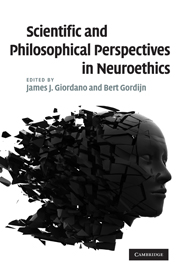Book contents
- Frontmatter
- Contents
- List of contributors
- Preface
- Acknowledgments
- Introduction
- 1 Developments in neuroscience
- 2 The origins of the modern concept of “neuroscience”
- 3 On the cusp
- 4 The mind-body issue
- 5 Personal identity and the nature of the self
- 6 Religious issues and the question of moral autonomy
- 7 Toward a cognitive neurobiology of the moral virtues
- 8 From a neurophilosophy of pain to a neuroethics of pain care
- 9 Transplantation and xenotransplantation
- 10 Neurogenetics and ethics
- 11 Neuroimaging
- 12 Can we read minds?
- 13 Possibilities, limits, and implications of brain-computer interfacing technologies
- 14 Neural engineering
- 15 Neurotechnology as a public good
- 16 Globalization: pluralist concerns and contexts
- 17 The human condition and strivings to flourish
- 18 The limits of neuro-talk
- Afterword
- Index
12 - Can we read minds?
Published online by Cambridge University Press: 07 May 2010
- Frontmatter
- Contents
- List of contributors
- Preface
- Acknowledgments
- Introduction
- 1 Developments in neuroscience
- 2 The origins of the modern concept of “neuroscience”
- 3 On the cusp
- 4 The mind-body issue
- 5 Personal identity and the nature of the self
- 6 Religious issues and the question of moral autonomy
- 7 Toward a cognitive neurobiology of the moral virtues
- 8 From a neurophilosophy of pain to a neuroethics of pain care
- 9 Transplantation and xenotransplantation
- 10 Neurogenetics and ethics
- 11 Neuroimaging
- 12 Can we read minds?
- 13 Possibilities, limits, and implications of brain-computer interfacing technologies
- 14 Neural engineering
- 15 Neurotechnology as a public good
- 16 Globalization: pluralist concerns and contexts
- 17 The human condition and strivings to flourish
- 18 The limits of neuro-talk
- Afterword
- Index
Summary
Can we read minds? Can neuroimaging serve as a new form of liedetector or reveal the essence of who we are? Should we be fearful that in the near future our personal thoughts will become publicly available through neuroimaging? Popular science and the media in particular have emphasized the mind-reading powers of neuroimaging. Questionable practices relying on such beliefs have begun to surface. Although appealing, these beliefs expose functional neuroimaging to potential abuse, and the equation between neuroimaging and mindreading betrays the sophisticated nature of tools such as functional magnetic resonance imaging (fMRI) and positron emission tomography (PET). At stake is a potential misunderstanding of the true capabilities of functional neuroimaging – a misunderstanding that can be perpetuated if the mind-reading paradigm is not thoroughly examined.
The goal of this chapter is not to consider the numerous ethical challenges in neuroimaging research in detail, since many general overviews have been published (Downie & Marshall 2007; Illes et al. 2007; Marshall et al. 2007; Racine & Illes 2007a). Instead, it specifically reviews ethical and social challenges related to the interpretation of functional neuroimaging research, in and outside of clinical care, in order to critically examine the mind-reading potential of functional neuroimaging. This popular portrayal of neuroimaging must be addressed in the context of a balanced discussion of risks and ethical issues related to neuroimaging and neuroscience.
- Type
- Chapter
- Information
- Scientific and Philosophical Perspectives in Neuroethics , pp. 244 - 270Publisher: Cambridge University PressPrint publication year: 2010
- 2
- Cited by



